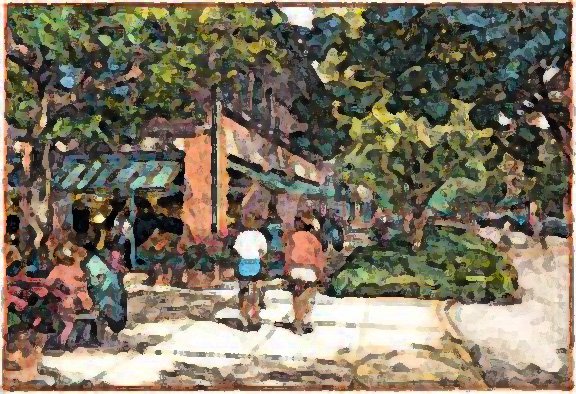Two years ago I moved into a townhouse on the northeast side of Austin. And not a day passes that I’m not on-my-knees grateful for my little yuppie house on the prairie. The neighborhood—quiet and green, with cute kids on bikes and an even cuter assortment of dogs (smashed-face Frenchies are especially popular)—is within walking distance of a small shopping center. It’s also just five miles to downtown which is especially important for me because I don’t own a car. I can’t fucking afford one.
Most of the places I want to go I can get to by bus, bicycle or Lyft. But there’s a lot of Austin—or Texas and the U.S. for that matter—out of easy reach. That’s not as bad as it sounds since I’m quite happy in the house I’ll likely be paying off until I die. But some days I do feel the lack of personal transportation more than others. Those are the days when I notice the differences between my home and those of my upper income neighbors. The trees and gardens that owners, rather than our HOA, planted with gorgeous finds from expensive local nurseries. The extra space and fenced-in yards. The hybrid and electric cars or expensive gas-run models that don’t look more than a few years old. On those days, I really feel it: the poverty of being just middle class.
A recent U.S. News and World Report article says that $52,500 is considered the lowest end of middle class for a family of three. My income is slightly under that, but I am also single. Which keeps me hanging in the middle class by the skin of my aging Gen X toes. The scary thing is that I can still remember a time not so long ago when the low cash end of middle class was enough to take care of a family of four. A time (circa 1990) when a $50K/year salary had the same buying power as a $114K/year one does now.
I’m not alone in feeling left out. Or, as some of the others who came into their homes the way I did—through an affordable housing program—have said, less than. They spit and grouse that their townhouses weren’t built with the same options for customization or the same attention to detail as full-priced properties. But you’d never really be able to tell that differences exist from the outside unless you lived here. Or counted windows and square footage and looked at the fine print. Our contracts tell us we can’t ever profit on our homes because when they sell, they will go to someone else on the (insanely long) waiting list for affordable homes.
That my fellow affordable homeowners are noticing what they don’t have (rather than what they do) is significant. Not because it outs them as complainers. But because it reveals an awareness of class, the one thing Americans rarely discuss. Because once upon a time everyone bought into the idea that they were middle class; and that middle classness, now gutted into oblivion, was the apex of everything good, true and beautiful. Here, people don’t like to talk about income or class because it makes them nervous. Once I said something about the poor/working class areas around us in an online community forum. Someone had mentioned criminal activity in the neighborhood and I observed that perhaps it might be coming from those areas. My post was promptly removed for assigning bad intent on the basis of socio-economic status.
The silencing—because that’s what it was—angered me. Equating poverty with criminality had never been my aim; most of the incidents I knew about did tend to involve people who were homeless or otherwise economically compromised. Was the "“disappearing” of my comment a manifestation of liberal elite guilt for having profited from a system that has ignored the needs of so many others? A way to fortify the walls of our sweet little urban bubble and deny that all of us in this community—and despite the economic differences no one talks about—live lives of privilege? Because the reality is we do. Austin is now one of the top 20 American cities with properties beyond the reach of middle income earners.
So living here in my little yuppie house on the prairie has at times felt problematic. But choosing to buy it over a vehicle? That was the best thing I could have done. Yes, I could finally have ditched public transportation and kept living in the bohemian east side apartment complex I loved. Then follow in the footsteps of outraged friends who saw their rents spike into the stratosphere this past year, hoping and praying I could find a place close enough to Austin that wouldn’t bankrupt either my housing or—in these inflationary times—my food and gas budget.
For now I’ll just ride my bicycle or join the great unwashed on Cap Metro buses. Most are clean energy vehicles because that’s how this town rolls and how I’d like to roll, too. If I can ever afford it.
